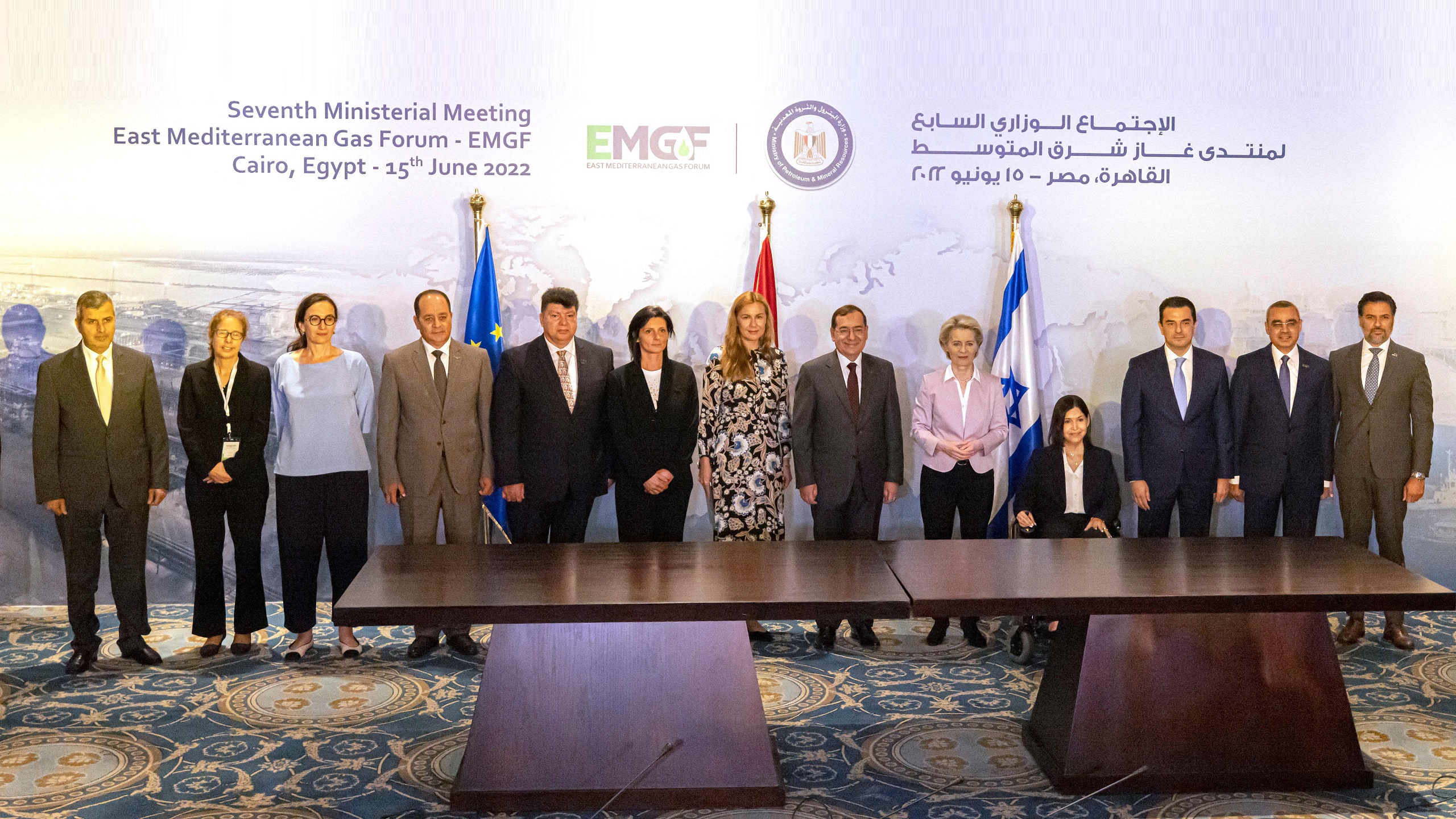Israel Signs Groundbreaking Gas Export Deal with Europe and Egypt
As the EU diversifies its sources of fuel, Egypt plans to become an energy hub
Israel, the European Union, and Egypt on Wednesday signed a memorandum of understanding to export Israeli natural gas to Europe via Egypt.
Karine Elharrar, Israel’s minister of energy, said the memorandum “reflects the growing ties between our nations … and shows what can be done by leaders working together for the good of the people in the Eastern Mediterranean and the wider Middle East.”
She spoke at a ministerial meeting of the East Mediterranean Gas Forum in Cairo, where the memorandum was signed.
We must not forget the division and conflict affecting Eastern Europe due to the invasion by the Russian Federation of Ukraine in February this year, which brought about the most extreme energy crisis that our friends in Europe have known in recent years
The deal is part of the European Union’s efforts to diversify its energy sources as Russia, which until the Ukraine war provided 40% of Europe’s natural gas, is under sanctions.
“As we celebrate prosperity and solidarity in the framework of this respected forum,” Elharrar continued, “we must not forget the division and conflict affecting Eastern Europe due to the invasion by the Russian Federation of Ukraine in February this year, which brought about the most extreme energy crisis that our friends in Europe have known in recent years.”
European Commission President Ursula von der Leyen, who visited Israel earlier this week to discuss energy cooperation, attended the forum and the ceremony where the memorandum was signed by Elharrar, Egyptian Minister of Petroleum Tarek El-Molla and EU Commissioner for Energy Kadri Simson.
Aviv Ayash, an energy and international relations specialist who served as foreign policy adviser to former Israeli Energy Minister Yuval Steinitz, told The Media Line that Israel has much more offshore natural gas than it needs for domestic consumption.
Israel found more than 1,000 billion cubic meters (BCM) of natural gas in its Mediterranean waters so far, and geologists say that there is another 1,000 BCM to find, he explained.
“This is more than we can ever consume,” said Ayash. “Israel consumes about 11 BCM a year so we secured our energy needs for the next 35 years, of natural gas. The rest of the gas is to be exported.”
Cyril Widdershoven, an international oil-gas market and geopolitical specialist, told The Media Line that who buys the gas in Europe and how when the first shipment arrives depend on the private companies.
“The EU is not able or allowed up till now to make real deals, so the current deal is an understanding between EU-East Med parties to sell or contract LNG [liquefied natural gas] or natural gas. It will be the private utilities or traders in Europe that still will need to set up deals and sign contracts,” he said.
However, Widdershoven added, “The EU is now showing commitment to access East Med on its natural resources. This commitment will be a major push for companies to get in.”
Ayash explained that what Israel did today was choose the fastest and easiest way to transfer Israeli gas to Europe, which was via Egypt.
The gas will be transported from Israel to Egypt through the existing pipeline and liquefied in the Egyptian plants. Then the liquefied natural gas will be sent to Europe by ship.
LNG takes up about 1/600th of the volume of natural gas in the gaseous state.
Ayash adds that the arrangement will benefit all the parties since Israel wants to sell its extra gas, Europe wants to diversify its energy resources and not rely on Russia, and Egypt wants to become an energy hub.
Widdershoven believes many European countries will be interested in receiving the gas. All countries that have either LNG regasification plants or LNG gas offshore will be able to receive the East Med LNG, he says. “Overall, LNG regasification is concentrated in Spain, France, Belgium-Netherlands-Germany or even the Baltic.”
Ayash cited this week’s visit by Italian Prime Minister Mario Draghi to Israel and noted that energy was surely one of the topics on the agenda.
“I think they will send the gas to Italy, but once they liquefy the natural gas it can be shipped to any country in Europe,” he said.
East Med LNG is at present totally competitive with all sources available
Concerning prices, said Widdershoven, “East Med LNG is at present totally competitive with all sources available.”
Natural gas via pipelines is still cheaper, he added. However, the absence of Russian supplies breaks all the rules, making the LNG competitive.
“Russian gas is cheaper but blocked,” Widdershoven said.
Ayash said the Israeli gas is of very high quality. “I think they would want to keep it even if they remove sanctions from Russia,” he continued.
He added that the EU demand for new energy sources will drive regional cooperation on all levels, even defense.
The Lebanese are now seeing that Israel is signing deals on natural gas with Egypt, with Europe, and with other countries, and they will want to also be part of the game
Ayash believes the memorandum signed in Cairo on Wednesday could be a game-changer in the Israeli-Lebanese dispute over the gas fields of the Mediterranean.
“I think this might help the Americans to bring back together the two sides, Israel and Lebanon, to the negotiation room and basically find a deal,” he said.
“The Lebanese are now seeing that Israel is signing deals on natural gas with Egypt, with Europe, and with other countries, and they will want to also be part of the game,” Ayash said.


